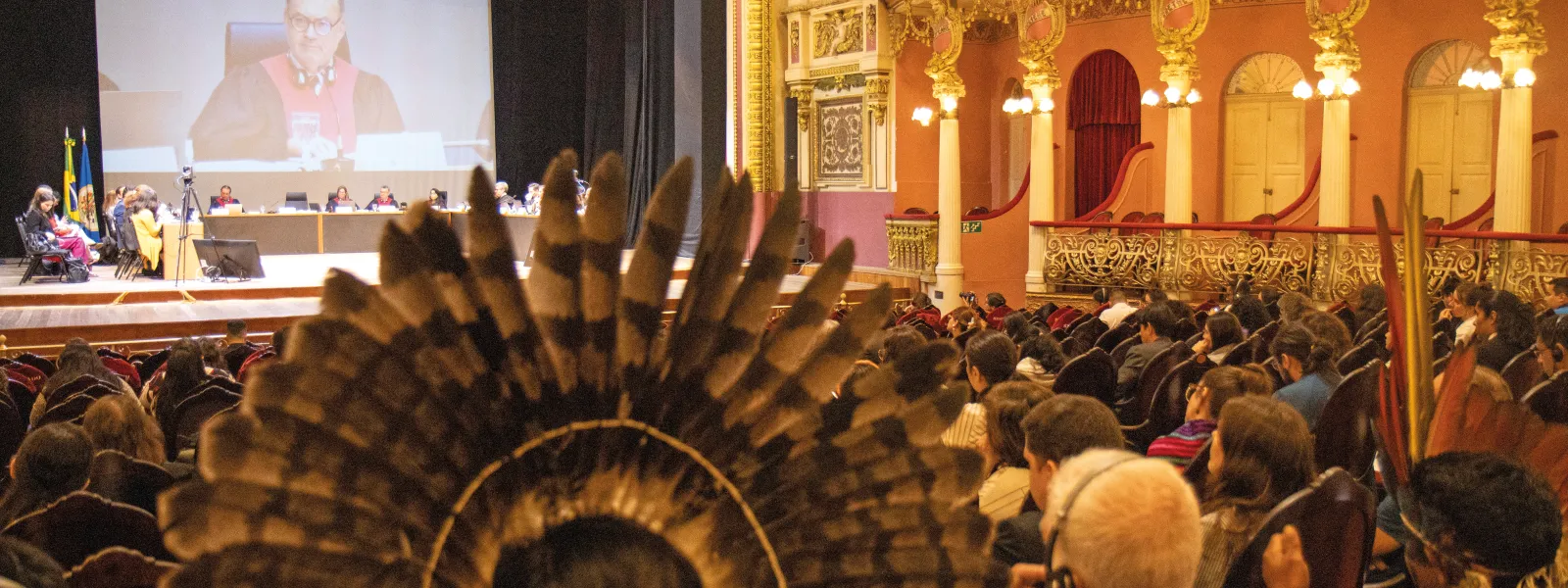
With the territories: 6 achievements for a healthy environment in 2024
Photo: Inter-American Court of Human Rights.
The knowledge, experience and insights that come from the land and communities are an important way to address the global crises of climate, pollution and biodiversity loss.
In 2024, by building bridges between communities affected by environmental degradation and high-level decision-making spaces, we at AIDA have helped to establish important precedents for the protection of a healthy environment in Latin America and the Caribbean.
These are achievements that show that victories for the environment and human rights on the continent depend on including the voice of those who care for nature and live in balance with it.
1. Inter-American Court ruling sets historic precedent for achieving justice in the face of industrial pollution
On March 22, the Inter-American Court of Human Rights published its decision in the case of the inhabitants of the Peruvian town of La Oroya, affected by extreme pollution from a metallurgical complex. It found the state responsible for violating their rights and ordered it to adopt comprehensive reparation measures. The ruling is the culmination of more than 20 years of struggle for justice and reparation, and is now the most important regional and global precedent for state oversight of corporate activities in the areas of human rights and the environment. AIDA has supported the case since 1997 and represented the victims before the Court. The outcome reflects our longstanding efforts to guarantee the right to a healthy environment in Latin America.
2. Voices from the Americas reach international tribunal to strengthen climate action
In a historic and emblematic event, communities, organizations and civil society alliances from the Americas brought their voices to the process of preparing the declaration that will, for the first time, clarify the Inter-American Court of Human Rights' obligations of the continent's governments to protect people in the face of the climate crisis. AIDA supported the inclusion of these voices through the submission of 15 legal briefs (amicus curiae) to the International Court and the testimony of community representatives at public hearings. We also submitted our own brief to demonstrate the existence of the right to a "stable and safe climate" as part of the universal right to a healthy environment, and the obligations of governments to guarantee it.
3. Green Climate Fund cancels project funding after evidence of human rights violations
In an unprecedented move, the Green Climate Fund - the world's leading multilateral climate finance institution - has canceled the disbursement of US$64 million to a forestry project following evidence of violations of the rights of indigenous and Afro-descendant communities in Nicaragua. The decision followed a complaint, supported by AIDA and allied organizations, submitted by the communities to the Fund's Independent Redress Mechanism, which launched an investigation and concluded that the project did not comply with the institution's policies and procedures on socio-environmental safeguards. The proposal that requested the funding ignored the context of violence and lack of human rights protection that indigenous communities in Nicaragua continue to suffer today.
4. Colombia's High Court reaffirms the right to free, prior and informed consultation
In response to two lawsuits supported by AIDA, the Colombian Constitutional Court, after finding that the territory of the Afro-descendant community of Afrowilches was directly affected, ruled that their right to free, prior and informed consultation had been violated in the environmental licensing process of two pilot projects for the extraction of unconventional hydrocarbons through fracking. This is a regional milestone in which the Supreme Court recognized that the processes and regulations governing the energy transition must be fair and guarantee the rights of communities that may be affected.
5. The Inter-American Commission hears about the human rights impacts of mining for the energy transition
In a public hearing, AIDA, together with communities and allied organizations, presented evidence to the Inter-American Commission on Human Rights of human rights violations associated with the extraction of lithium, copper and other minerals used in the energy transition. These violations are already occurring in highly biodiverse areas vulnerable to mining pressures, such as the Gran Atacama —a region located in the cross-border Puna region of Argentina, Bolivia and Chile— and the Amazon. At the hearing, we will ask the Commission to urge the continent's governments to take concrete steps to protect human rights in energy transition processes.
6. Civil society paves the way for ratification of the High Seas Treaty
The AIDA team joined Latin American government representatives and experts in a series of informative meetings to dispel doubts about the High Seas Treaty —which aims to protect life in the area of the ocean beyond national waters— and to highlight the importance of its ratification, as well as the transfer of knowledge and experience between countries. Issues such as the equitable benefit-sharing mechanism, capacity building and the role of civil society in the implementation of the treaty were addressed, with an emphasis on the realities of each country. Against this backdrop, Panama ratified the treaty in October. To enter into force, the treaty needs to be ratified by 60 countries.
In our 2024 Annual Report you’ll find more information on these achievements and our review of the year.
Victor Quintanilla Sangüeza

Victor Quintanilla Sangüeza is AIDA's Content Coordinator, working from Mexico City. He is a Bolivian freelance communications specialist and journalist. He earned a Bachelor of Science in Social Communication from the Universidad Mayor de San Andrés in La Paz, Bolivia. Victor also holds a master's degree and a PhD in communication from the Universidad Iberoamericana Ciudad de México. He has worked in print and television media, as well as in corporate communication in the public and private sectors. Victor is also a researcher in the field of journalism and technology studies.
